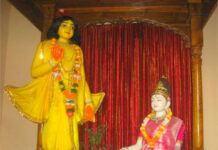It wouldn’t be an overstatement to say that everyone makes mistake. In fact people are bound to make mistakes as that is how human brains are wired. In other words, our senses are defective. As such, humanly speaking, making mistake is not an offense. However, quite often we don’t realize that we were or we are wrong. This is when the life gets difficult not only for ourselves but also for those surrounding us.
Dealing with mistakes is not always easy, especially when we have denied committing them. Saying a quick “sorry” may help but at times even that appears difficult to say. If we know we are wrong but try to prove otherwise, it is outright unethical and must be avoided, but there could be instances when we come to know our mistake later. How to deal with it? Or should we just bury it so no one knows about it? This is when our integrity is tested.

There are different types of mistakes that people make. Some are just embarrassing ones but harmless while others could be affecting ourselves and others. Situations like when you spill water on a dining table at a party or find yourself speaking too loud in a library are examples of simple embarrassment and may be easy to work with. But when our mistake affects others it becomes particularly difficult as in such cases we need to deal with two parties; 1) the offended party, 2) ourselves. The situation becomes even more complex when after a long session of arguments we realize that we were wrong. Of course, it is better to know it later than never.
Different people deal with their mistakes in different ways. Generally, when a mistake is made, people start pointing at others as human tendency is to defend oneself, but that doesn’t really help and often turns ugly. Some try to hide mistakes, some pretend to believe and make others believe that nothing has gone wrong, while those who are wise accept their mistakes and correct them.
Dealing with the offended party when we realize we are wrong:
This depends mainly on three factors: 1) Nature of the mistake and severity of its aftereffects; 2) how long we took to admit that we are wrong; 3) nature of the offended party. As mentioned above, saying “I am sorry” is not always enough. It is also possible that the offended party is not willing to accept our verbal apology but wants to see our actions to prove it.
Admitting our mistake can be really ego-hurting. This is more true if we had argued how we were right. Even worse, if we had argued that the offending party was wrong. Nonetheless, it is always better to admit our faults as soon as we realize we are wrong. Embarrassment may follow but it won’t last. People may talk about you or even laugh at you, but the final winner will be you as, after all, those who criticize it also know how many mistakes they themselves made in life but didn’t have the courage to admit it.
If your mistake has caused severe damage to someone, it is best to undo it by suitably compensating the damage. That will show the other party that you are sincere. Compensation does not have to be financial. What compensation you can offer depends on what the offended party has lost due to your action and what he or she values the most. If you caused someone reputational damage, then do your best to actively restore it and let the person know you are doing it.
Be genuine. Do not tell your listeners that you are doing it just to pacify the offended party and that in reality it is you who is right! Such an attitude will eventually hurt yourself.
Apology should be unreserved. If we really believe we are wrong then let the message be straight to that point. Avoid words like “but” and “however” as they show your unwillingness to accept full responsibility.
Humility is considered to be the most powerful tool especially when it comes to pacifying an offended party. Lord Chaitanya advised that we remain humbler than a straw in the street and more tolerant than a tree. Offer your apology using all humility at your command. When we understand we are wrong, it is good to admit it as soon as possible as delaying it will surely make it more difficult to deal with at a later date. This may sound negative but that’s how it is.
Dealing with ourselves when we find out we are wrong
This involves to main factors; our false ego and our self-esteem. We need to understand that ego and self-esteem are two entirely different things although they may appear to have some similarities. False ego, which is generally called ego, is born out of ignorance but self-esteem is a product of knowledge. As explained in this article, self-esteem does not cause arrogance; false ego does. Self esteem makes one confident of oneself and as a result the person develops genuine humility. False ego makes oneself over-confident and as a result he or she develops arrogance.
Admitting we are wrong means directly smashing our false ego. Until we learn how to subdue our false ego, there is no hope to come to the platform of real knowledge, which is the knowledge of spirit. Again, humility is the best weapon when it comes to working with false ego.
One needs to be cautious as to not destroy one’s self-esteem by unnecessarily accepting blames in the name of humility. Saying we are wrong is not wrong, but saying it when we are not, is wrong. This is because by knowingly and repeatedly accepting false blames one can gradually feel hopeless in life and develop bitter feelings towards the accusers. Instead, it is better to clear our stand cool-headedly and leave the rest. One has to be reasonable to oneself.
On top of everything else, it could a most satisfying experience when we are able to admit we are wrong. This is because admittance of fault is directly connected to truthfulness and when we are truthful we are automatically fearless of and satisfied with any outcome.
No one has ever been happy at mind nor can any one be, by not accepting truth. The Supreme Lord is the Absolute Truth and by accepting His shelter we can quickly get over the worldly fear that prevents us from admitting that we are wrong even after we realize it.




































